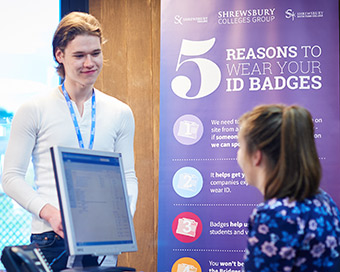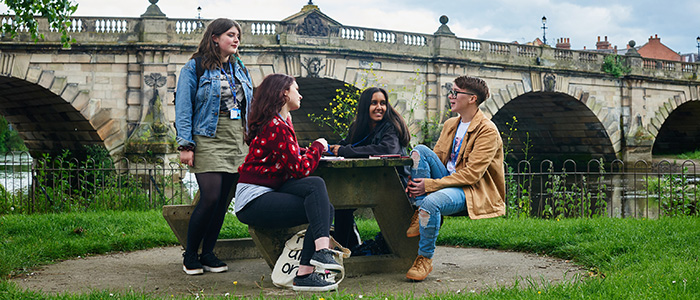We've broken down all the key differences between the academic and vocational courses that you can study here at the largest college in Shropshire.
If you’re taking your GCSEs next summer, you’re probably starting to think about college and what you’d like to study there.
But your subjects aren’t the only thing you’ve got to make careful decisions about. Before you start debating between Art and Photography, you need to figure out which type of course is best suited to you and the way you learn.
A-Levels and vocational courses: the basics
Two of the most popular routes for secondary school leavers are studying either A-Levels or a vocational course (often called BTECs). The basic differences are this:
- A-Levels are two-year courses where you study three different academic subjects which are mainly assessed by exams
- Vocational courses are one or two-year courses where you study one vocational subject which is mainly assessed by coursework
One Level 3 vocational diploma is equivalent to three A-Levels.
Both course types open you up to a vast range of subject options: with A-Levels in everything from Geology to Textiles and vocational courses in everything from Travel & Tourism to Engineering.
Unless you’ve already set your heart on becoming a biologist or a chef and know exactly what qualifications you’ll need to get there, you might be struggling to decide whether to take A-Levels or a vocational course. And even if you do have a specific career in mind, there’s often more than one path to getting the qualifications you need. This decision is especially tricky if you’re interested in subjects that exist as both A-Levels and vocational courses, like Business and Performing Arts/Drama.
We’ve put together this battle of the courses to break down each of the crucial differences between A-Levels and vocational courses so that you can make a confident decision about your future.
Have a look through each of the categories below to work out which type of qualification is the right one for you.
Exams vs. coursework
- A-Levels are mostly assessed by end of year exams
- Vocational courses are mostly assessed by coursework
For a lot of people, choosing whether they prefer exams or coursework seems easy; even people who do well in exams can hate taking them. But which type of assessment is better suited to you as a student is a more complicated question.
Though the idea of your grade depending on a couple of days’ work sounds scary, that’s not what taking A-Level exams really feels like. The plus side of A-Levels is that you don’t get tested until right at the very end of the course. That way, you’d have learnt everything you were going to be taught about your subjects and you’ll have been given lots of time to revise. The work that will count towards your final grade is the work you’ll do when you’re feeling most prepared to be assessed.
But exams aren’t for everyone. The time pressure of exams sometimes makes it difficult to do your best work and vocational courses being mainly assessed by coursework makes them a less stressful alternative. After having studied a course for years, it can feel like a more accurate representation of your actual knowledge and ability to have the freedom to complete your assessments over a longer period of time.
It’s important to remember that a number of A-Levels aren’t purely exam-based and many vocational courses aren’t purely coursework-based. Make sure to check how the specific subjects you’d like to study are going to be assessed before you make any final decisions. This is especially important if you’re interested in A-Level arts subjects, where coursework can make up a big part of your grade.
Multiple subjects vs. single focus
- A-Level students usually take three or four subjects
- Vocational students take one subject
If you know which industry you’d like to work in after you’ve finished school, studying a vocational course could be a really good use of your time. Instead of struggling to come up with three different subjects to study at A-Level, vocational diplomas offer anyone who has one main interest the chance to dedicate all their attention to becoming a specialist in that area.
Plus, if you’re worried about not getting the GCSE grades to do a Level 3 vocational course, you can usually enter your subject at a different level and work your way up to a Level 3 qualification. For some highly technical subjects, like Carpentry & Joinery, everyone has to enter the course at Level 1 since there are specific skills you need to learn before you can move on to anything else.
On the other hand, A-Levels give you a more varied college experience. You’ll have time to figure out which subjects you prefer and want to explore further in the future. But that’s not to say that A-Levels are for people who haven’t made up their minds yet. Certain universities and employers will prefer you to have a background in a few different subjects. For example, if you're applying to study for a physics degree, you’d need to prove that you’re also skilled in maths.
Besides, your A-Levels shouldn’t be a mismatched compilation of subjects but should complement each other, leading to a certain degree course or career path. Most students take three A-Levels, but if you have particularly high GCSE grades, your college might allow you to study four subjects.
Academic vs. vocational
- A-Levels are academic courses
- Vocational courses are taught in a more practical way
A-Levels are academic courses, which means that the course content is focused on theory. Many A-Levels also include some practical elements (like experiments or fieldwork), but your studies will mainly involve getting to grips with a lot of information. Luckily, you should have some idea about whether you enjoy academic subjects since GCSEs are academic qualifications. If you want to continue learning in a similar way (though in far more depth), then A-Levels are the obvious choice.
But if you’d like to try something quite different to your GCSE courses, you may prefer vocational qualifications, where you’re taught subjects in a more practical way. You’ll still learn the theory behind everything you do, but your focus will be on building up a bank of skills and knowledge (like how to build a staircase or design a website) that you can take with you into the workplace after you’ve finished studying.
In fact, vocational timetables are structured differently than A-Level timetables, typically being organised to make sure you don't need to come into college every single weekday. This gives you time to add to your CV by working a job relevant to your course when you’re not in college (e.g., Construction & the Built Environment students often find placements on local building sites).
You can continue studying at university or head straight into employment with either academic or vocational qualifications. Here at SCG, we’ve even had A-Level and vocational students progress onto the exact same university courses, from history at Aberystwyth University to adult nursing at the University of Chester.
What should you do next?
Once you’ve decided between A-Levels and vocational courses, it’s time to start exploring which subjects you’d like to study and where you’d like to study them. Colleges and sixth forms throughout Shropshire will hold open evenings and subject taster events that you can attend (either virtually or in-person) to get a sense of what to expect and to ask for advice specific to your interests and situation.
If you’ve read this article and are still unsure about what you want to do when you’ve finished school – don’t panic! There’s more to find out about both A-Levels and vocational courses, and there are other options beyond either of those qualifications.
You can:
- Have a look through what specific A-Level and vocational subjects involve studying by browsing through some courses.
- Find out about CTEC qualifications. These are vocational courses like BTECs that are each equivalent to one A-Level and are designed to be studied alongside A-Levels (you can look at Shrewsbury Colleges Group's CTECs in Applied Science, Business and Health & Social Care for examples).
- Visit SCG’s Virtual Post-16 Options Event to discover the wider list of opportunities available to you in Shropshire once you’ve completed your GCSEs.








